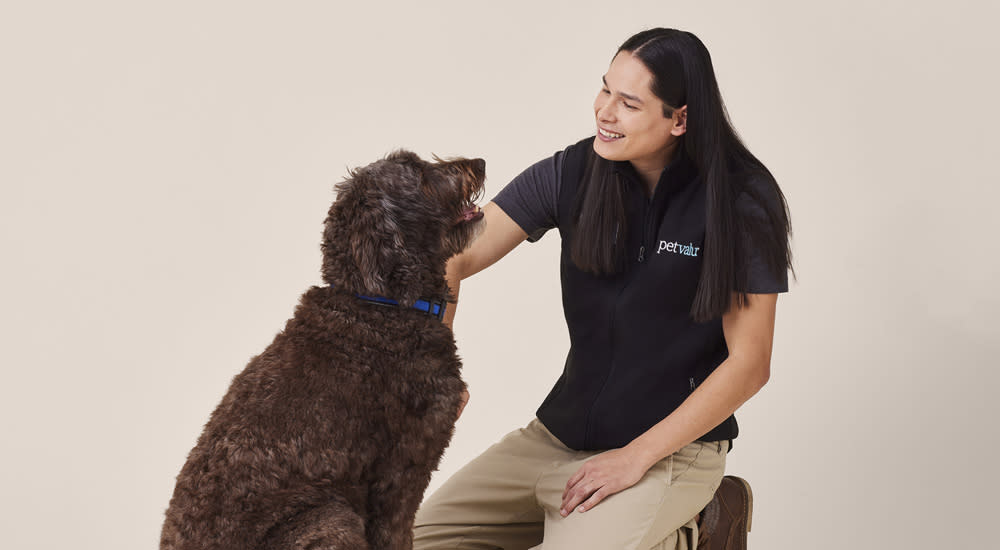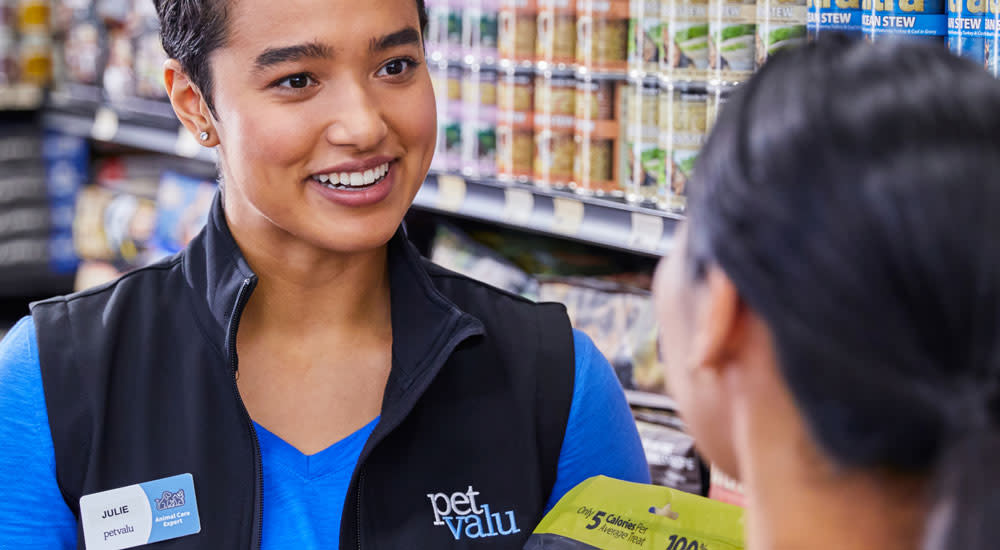What is an “Animal Care Expert” and how do they help pet parents?

Walk into any Pet Valu, Bosley’s, Total Pet, Tisol, or Paulmac’s Pets store across Canada and you’ll likely find an educated Animal Care Expert or ACE ready to help you with a variety of pet care questions — whether you’re wondering which habitat will make your lizard happiest or want to choose a kibble that will appeal to your picky cat.
Pet Valu ACEs are on hand to do far more than ring up your pet supply purchases. They’re eager to make your journey as a pet parent easier by offering advice, sharing their knowledge, as well as demonstrating compassion and care when it comes to the health and wellness of your pets.
We understand how important our relationships are with our pets. More often than not, our staff are pet parents, too. While they can share their own pet experiences with customers, they also complete ACE training courses that are designed to provide them with valuable knowledge on a wide selection of pet care topics such as fundamental care, nutrition, and much more.
ACE training consists of two animal care education levels (Enthusiast and Expert) and is completed by in-store staff during their first 180 days of employment with Pet Valu.
Then, every following year, each ACE undertakes a refresher course designed to keep their pet care knowledge up-to-date with developing trends and new pet care products.
To learn more about ACE training, we went to Pet Valu Customer Service Representative and former store manager Zana Ellis to learn about what it takes to become an Animal Care Expert — and how that knowledge can benefit pet parents.
Ellis is part of the team that develops the ACE training and knows all about the philosophy behind the courses and how they’re designed to support pet parents.
Why ACE training is important to Pet Valu
ACE training is based on Pet Valu’s Four Paws — the company’s cornerstone values — of safety, compassion, expertise, and efficiency. “We want to make sure that everybody in the store, consistently across the board, no matter where you are in the country, can effectively offer valuable advice,” says Ellis.
ACE training is in no way meant to stand in for or replace the pet care you get from a veterinarian or animal nutritionist, but a chat with your local ACE may help with less technical (but still important!) questions, so you can make more informed decisions.
“It's not just caring about the pet,” notes Ellis. “We also care about people, too. We care about supporting their relationship with their pet as well.”
Ellis, whose background is in animal welfare, says the team wanted to design an educational program that not only supports pet parents as they care for their pet, but in some scenarios even helps enable pet parents to have a longer life together with their beloved animal.
Through the ACE training program, Pet Valu aims to equip staff with that pet care information so that they can, in turn, pass it on to pet parents and help them to build a strong care routine that keeps pets happy, healthy, and safe in their homes.

How Pet Valu employees become Animal Care Experts
When a new staffer joins Pet Valu, they complete an online training and testing course within their first 180 days on the team.
Beginning at the level of Animal Care Enthusiast, the courses they cover include: dog and cat basic care, dog and cat basic nutrition, and dog and cat common health concerns. They also study small animal care for reptiles, rodents, amphibians, birds, and fish.
Moving on to the Animal Care Expert level, ACEs do a deeper dive into cat and dog feeding as well as cat and dog health concerns. They also learn about cat and dog grooming and get a more nuanced understanding of small animal care.
Pet Valu is currently in the process of expanding their Expert level training to include even more in-depth learning about birds, amphibians, reptiles, and fish.
When you’re in a store, you can identify an expert by their name tag, which will have the designation ‘ACE’ on it.
ACEs are always happy to work together to share both what they’ve learned from training, as well as their personal experience with pets to help and support pet parents.
“If a customer comes in and they ask a question that our ACE doesn't know,” says Ellis, “they’ll go to another team member and say, ‘Hey, you have a snake, can you help?’ We share the love, so there's always a learning opportunity as well.”
ACEs are trained to answer your pressing pet questions
ACE training is structured to help Pet Valu staff answer the most common questions posed by pet parents.
When designing the program, Ellis and the rest of the team centred each training module on the questions and issues that pet parents regularly ask when they visit a store.
Unfortunately, our pets can’t talk to us (yet) so we have to learn to understand them through their body language, habits, and other non-verbal reactions or cues. And while living with an animal can definitely help us humans hone that skill, sometimes pet parents want a second opinion.
Some of the types of questions you can ask an ACE include:
How important is dental care for my rabbit and what tools or products can help keep their teeth in good shape?
What kind of light do I need for my bearded dragon’s habitat?
Are my puppy’s nails too long and are there alternatives to clipping them?
Does my betta fish need a lid on their tank?
My dog is getting older, when should I consider changing their diet?
My cat has been litter-trained forever but now they’re having accidents, do you know why?
Is this fill-in-the-blank-issue normal or should we go see a vet about it?
These are just a few examples of the pet care issues ACEs have assisted with. All you have to do is ask.

The top question ACEs get asked is…
…“what do I feed my pet?”
Pet parents often want to know what the “best” food is for their animal.
But of course, one dog will have a different palate from another, and different fish will have different dietary requirements.
Also, pet parent preferences play a role, or perhaps pet food choices are dictated by budget.
Pet Valu ACEs get asked about pet food all the time, which is why nutrition is such a big component of their vet- and nutritionist-informed training.
To help you find the best food for your specific pet, they’ll ask you about your pet’s age, activity level, taste preferences, possible allergies or food intolerances, as well as about the kind of food that best serves your lifestyle and the nutrition goals you have for your pet.
“Pet parents typically want to feed their pets a healthy diet that matches their own personal dietary preferences,” says Ellis.
Unless your pet has dietary restrictions, sensitivities or needs food for a specific stage of life or condition, there’s often no right or wrong when it comes to pet food, she says.
“Some people want grain-free, some people want ancient grains — they're both nutritionally balanced, complete, and healthy. That's one of the reasons we have a lot of options, and of course matching treats too.”
When you’re making dietary choices for your pet, ACEs can:
How important is dental care for my rabbit and what tools or products can help keep their teeth in good shape?
Help you decide between kibble, canned, or freeze-dried raw food (or help you to create a diet plan that involves a combination of these formats)
Assist in transitioning your pet from one food to another without aggravating your pet’s digestive system
Advise you on why your pet may not be accepting a new food and how to get them to ease in to the switch
Talk to you about when it’s time to switch foods based on your pet’s age or weight
Recommend treats or supplements to support your pet’s dental hygiene and overall wellness
Review and decode the ingredients list on pet food, supplements, and treats to decide if they’re right for your pet’s needs
If you come to an ACE with a diet or nutrition question they can’t answer, they can turn to Pet Valu’s in-house nutritionist for support. They can address pet parents’ dietary concerns via email, either directly or via an ACE.
How ACEs can help with pet care concerns
ACEs are trained to assist all types of pet parents with questions about all types of pets, from lizards to dogs and everything in between.
No matter how devoted or experienced a pet parent is, an ACE can often help to expand their knowledge and care for their BFF by alerting them to pet care issues or topics to consider.
Here are some examples of our ACE advice and insight.
Did you know:
That you should always pick up your pet turtle like you’re picking up a ham sandwich? That way, if they accidentally scratch you, you’re less likely to drop them and cause an injury.
That non-stick coatings are toxic for birds? This means that you shouldn't have your bird’s habitat anywhere near a kitchen where you’re heating up and using Teflon cookware.
That there are big differences between infrared heat lamps, daylight lamps, and basking lamps for reptiles? Your setup will differ depending on your lizard’s natural habitat.
That chinchillas can live up to 20 years? This makes out-of-habitat enrichment time even more important for these animals in order to build a closer bond with their pet parent.
That a rabbit’s teeth never stop growing? Pet parents with this kind of animal need to provide them with chewing treats and toys that feature different textures and hardnesses in order to naturally help grind down their teeth.
That hamsters are nocturnal and don’t like to be woken up in the middle of the day to play?
That baby guinea pigs are born fully covered in hair and already capable of feeding themselves?
ACEs are there to offer advice or look at a pet care issue from a different angle that might produce a new solution. Their job is to assist pet parents in the decisions they make for their pets, as well as to support and nurture their parent/pet relationship.
“Being able to really understand the products and the needs and to harmonize that all together,” says Ellis, “you end up helping customers take care of their pets in a healthy, emotionally enriching, and bonding way.”









































